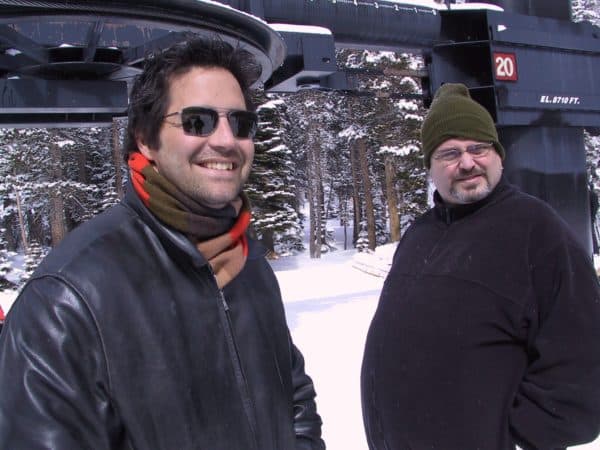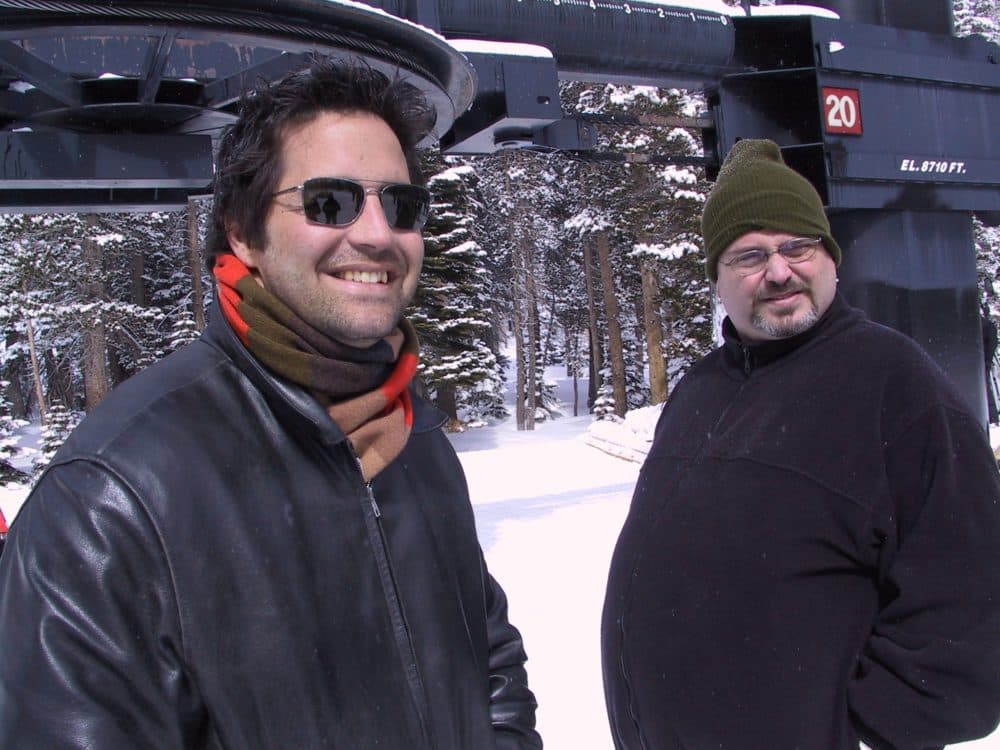
Aaron Evanson and John Godsey were making the three-hour trip from Indianapolis to Chicago in the fall of 2001 when they hatched the idea to rhyme "friends" with "twins."
At the time, Evanson and Godsey worked for the advertising firm Foote, Cone & Belding. Evanson was an art director, and Godsey was a senior copywriter.
Together, they'd been tasked with cooking up fresh ideas for Coors Light. The instructions the Golden-based beer company gave Foote, Cone & Belding were simple: Create something that would resonate with the early- to mid-20s demographic of men, and incorporate music.
Evanson and Godsey began brainstorming. Godsey thought back to a song he'd heard on the radio as a child, Tom T. Hall's "I Love."
"It was an old country hit," Godsey said. "'I love little baby ducks / Old pickup trucks / Slow moving trains / And rain / And I love you too.' I was like, ‘What if we change the words?'"
Evanson and Godsey swapped out "baby ducks" and "pickup trucks" for two things their target demographic might find more appealing: football on TV and Gena Lee Nolin, an actress who starred in "Baywatch." They also worked in "hanging with my friends." And the kicker?
"That’s where the twins came in," Godsey said.
"I love football on TV / Shots of Gena Lee / Hanging with my friends / And twins," were the lyrics the two of them came up with in the car that day.
The idea Evanson and Godsey cooked up eventually morphed into a smash hit. The series of advertisements that resulted, "Love Songs," became a cultural phenomenon so big "Saturday Night Live" spoofed it and controversial enough to give former chairman Pete Coors headaches down the road.
A decade and a half after the first "Love Songs" advertisement aired, Evanson and Godsey took some time to reflect on their much loved and reviled campaign with Denverite.
They recorded the song on a Sunday.
Once Evanson and Godsey made it back to Chicago, they met with their creative director to present their idea. He wasn't sold until Evanson pushed for it.
"He hated the idea," Godsey recalled. "We presented a bunch of our other ideas, too. Aaron fell on the sword and was like, 'You don’t understand. This is the only good idea on the table.'"
After some coaxing, Evanson and Godsey got him to sign off on it. A weekend later, they met up with John Ferreira, a music producer they'd worked with in the past on a DiGiorno Pizza campaign. Godsey played the Tom C. Hall song for Ferreira and asked him how they could put their own spin on it.
"We did one version that was kind of a Sex Pistols, Blink 182 kind of vibe, right? It was great. And I’m like, 'Yeah, that’s good. It’s really solid,'" Godsey said. "But then John Ferreira, the composer, was like, 'Well dude, I’ve got this riff, man.' It was like BOM BOM BOMMMMM."
Godsey thought the riff sounded like something Limp Bizkit might come up with. In a good way. He wanted to use it. That afternoon, the three of them rushed to the Guitar Center before close to pick up a rectifier amp head. They wanted to give the riff a harsher sound.
"We bought one, plugged it in and got the sound," Godsey said. "And that was it."
The first "Love Songs" commercial aired in the spring of 2002. It starred Nolin from "Baywatch" and the identical twins Diane and Elaine Klimaszewski. Steven Simoncic, who worked as a copywriter at a rival firm at the time, sang the vocals.
"We played it when the client came in," Godsey said. "At the end of the day, Leo Kiely, who was the president of Coors, was like, 'I’ve got one thing to say: Twins.'"
The commercial was a hit right away. Foote, Cone & Belding got one report back about students at the University of Michigan in Anne Arbor stopping conversation in a bar to belt out the song together. That fall, the NFL began airing the commercial during breaks in action.
In February 2003, "Love Songs" got the "Saturday Night Live" treatment. In the sketch, two men vie for the attention of conjoined twins played by Jennifer Garner and Rachel Dratch. Both men are more interested in Garner than Dratch, who has a baby arm protruding from her head.
"I just started shaking," Evanson said. "I was freaking out. I was like, 'Woah, woah, woah. What's happening?' I was trying to wake my wife up without waking our baby up, and I was like, 'You've got to get up and watch this.' I've really only ever had two life goals. SNL or 'The Simpsons.'"
"Love Songs" received its fair share of backlash, too.
In 2004, Pete Coors, who was then the chairman of the Coors Brewing Company, decided to run for Senate as a Republican. After he announced his candidacy in March, it didn't take long for local media outlets to point out the contradiction between the values Coors preached and the commercials his company aired during football games.
"Although Coors has been an official candidate for the Republican nomination less than one full week, at least four newspaper columns already have laid the wood to him over his company's beer advertising, especially its use of the Klimaszewski twins to sell Coors Light," wrote Vincent Carroll in a Rocky Mountain News editorial published on April 17, 2004. "You can bet this is only the beginning of an onslaught of commentary insisting Coors answer for his company's sexually suggestive commercials and slightly crude appeals to the young male market."
A USA Today poll conducted in 2003 found that the ad earned a "dislike" score of 22 percent, which was significantly higher than the average "dislike" score of 13 percent. The poll also found "Love Songs" were much more popular among men than women, as 29 percent of men reported liking the ads "a lot" compared to 16 percent of women.
"They had these two women who named it the most misogynistic ad of the year," Godsey said. "I was like, 'Really?' I had to look up what misogynistic meant."
Both Evanson and Godsey dismiss the idea that the "Love Songs" campaign was sexist.
"Men are simple creatures. All we did was tap into that," Evanson said. "We had so many wives and girlfriends, when they found out we did it, almost thank us for it because we made fun of their spouse and boyfriend."
"It’s a man cave of a love song," Godsey said. "So that’s kind of how it was. It was in no way meant to be misogynistic. That was the furthest thing from mind. It was just, 'What would be funny?' It was if a guy loved these things and he sang about them and he was kind of a meathead, you know?"
Coors ended up discontinuing "Love Songs" in 2004. Godsey said he believes Coors stopped airing the commercials due to political pressure.
"The thing became controversial," Godsey said. "Pete Coors was running for Senate. He was kind of on the right. His right base threw him under the bus. It kind of died a death that way."
Evanson, 46, and Godsey, 51, have since moved on from Foote, Cone & Belding. Both now work for VML, an advertising agency based in Kansas City. Evanson is an executive creative director there. Godsey's title is North American Chief Creative Officer.
Evanson and Godsey said they're unsure of how the "Love Songs" campaign would be received if it was released today. On one hand, the target demographic the campaign attempted to reach has changed. On the other, the internet is no longer in its infancy. There was no Facebook, YouTube or Instagram in 2002.
"The 20 somethings then are completely different than the 20 somethings now," Evanson said. "So I don’t know if it would play. But imagine if you had the internet with something that hot. Imagine the memes that would’ve come out of it."
Subscribe to Denverite’s weekly sports newsletter here.












